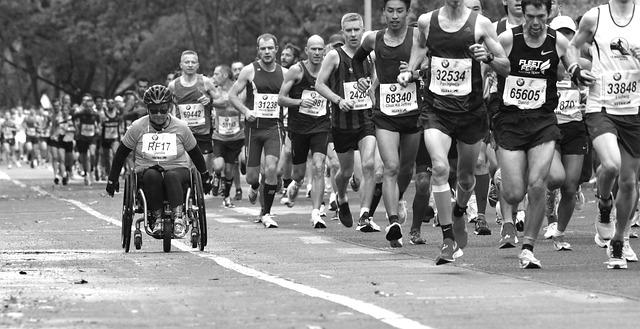In the relentless world of ultra-endurance running, where athletes push their bodies to the absolute limit over countless miles, nutrition plays a critical role in sustaining performance and staving off exhaustion. A new study featured in Frontiers sheds light on the dietary strategies employed by ultra-endurance runners as they prepare for-and compete in-a grueling continuous 24-hour event. Offering fresh insights into how these athletes fuel their extraordinary feats, the research reveals patterns and preferences that could reshape nutritional guidelines for endurance sports. As ultra-marathons and endurance challenges gain popularity worldwide, understanding the nuanced relationship between diet and prolonged physical exertion becomes more vital than ever.
Dietary Strategies That Fuel Ultra-Endurance Performance
Ultra-endurance athletes tailor their nutrition meticulously to sustain energy output and delay fatigue during continuous events lasting 24 hours or more. A consistent theme among successful runners is the prioritization of carbohydrate loading in the days leading up to the event, combined with a balanced intake of fats and proteins to bolster metabolic flexibility. During the race, frequent consumption of easily digestible carbohydrates, such as gels, sports drinks, and energy bars, helps maintain blood glucose levels and stave off glycogen depletion.
Hydration strategies are equally critical, with emphasis on electrolyte balance to prevent cramping and hyponatremia. Athletes often adopt a scheduled intake approach, consuming nutrition at set intervals rather than waiting for hunger or thirst cues. Below is a snapshot of nutrient timing and preferences reported by top ultra-endurance runners in a 24-hour continuous event:
| Nutrient | Pre-Race (48-24h) | During Race | Consumption Frequency |
|---|---|---|---|
| Carbohydrates | 70% of intake | 30-60g per hour | Every 20-30 min |
| Proteins | 15-20% of intake | Small amounts to aid recovery | Every 2-3 hours |
| Fats | 10-15% of intake | Moderate, often from solid food | As tolerated |
| Electrolytes | Balanced diet | Key focus on sodium, potassium | Every 30-60 min |
| Fluids | Hydration optimized | 500-1000 ml per hour | Regular sipping |
Key Nutritional Insights From Continuous 24-Hour Event Runners
Analysis of nutritional strategies adopted by ultra-endurance runners during continuous 24-hour events reveals a distinct emphasis on balanced macronutrient intake to sustain prolonged energy output. Carbohydrates remain the cornerstone, often comprising over 60% of total caloric consumption, primarily through easily digestible sources such as energy gels, bars, and sports drinks. Proteins and fats, while secondary, play crucial roles in muscle repair and satiety, with athletes frequently integrating small amounts of lean protein and healthy fats during recovery intervals within the event.
Hydration protocols are equally critical, with athletes showing consistent patterns of electrolyte replacement to prevent imbalances caused by sweating. The observed approaches can be summarized as:
- Regular intake of carbohydrates every 30-45 minutes to avoid energy dips
- Balanced electrolyte supplementation to maintain sodium and potassium levels
- Moderate protein consumption for muscle support without gastrointestinal discomfort
- Fat intake limited to small doses to optimize fat oxidation without slowing digestion
| Nutrient | Average Intake (% total kcal) | Primary Sources | |
|---|---|---|---|
| Carbohydrates | 60-70% | Energy gels, bars, sports drinks | |
| Proteins | 10-15% | Lean meat, protein shakes | |
| Fats | |||
| Fats | 15-25% | Nuts, seeds, oils (small amounts) |
| Time Frame | Carbohydrates (g/hr) | Fluids (ml/hr) | Electrolytes |
|---|---|---|---|
| 0-6 hours | 60-70 | 400-600 | Moderate sodium (300-500 mg) |
| 6-18 hours | 70-90 | 500-700 | Increased sodium (500-700 mg) |
| 18-24 hours | 60-80 | 400-600 | Maintain or slightly increase sodium |
- Prioritize easily digestible carbohydrate sources like maltodextrin and glucose during higher-intensity segments.
- Use caffeine strategically to enhance alertness and reduce perceived effort.
- Prioritize easily digestible carbohydrate sources like maltodextrin and glucose during higher-intensity segments.
- Use caffeine strategically to enhance alertness and reduce perceived effort.
- Consume small amounts frequently to optimize absorption and minimize gastrointestinal issues.
- Monitor electrolyte levels closely and adjust intake based on individual sweat rates and environmental factors.
- Test all nutrition plans during training to ensure tolerance and effectiveness on race day.
Sure! Here’s the completion of the list and a bit of a summary to round out the section:
If you’d like, I can also help with further optimizations or styling suggestions!
In Conclusion
In conclusion, the dietary strategies employed by ultra-endurance runners during continuous 24-hour events reveal a delicate balance between maintaining energy, hydration, and gastrointestinal comfort. Insights from the Frontiers study highlight the importance of personalized nutrition plans that adapt to the prolonged physical demands and changing physiological needs throughout such extreme endeavors. As ultra-endurance competitions continue to grow in popularity, these findings offer valuable guidance for athletes and coaches aiming to optimize performance and endurance through tailored dietary approaches. Future research will no doubt deepen our understanding of how nutrition can best support these extraordinary feats of human stamina.





